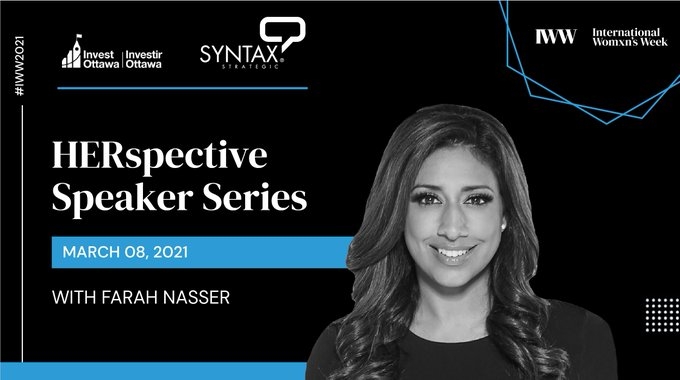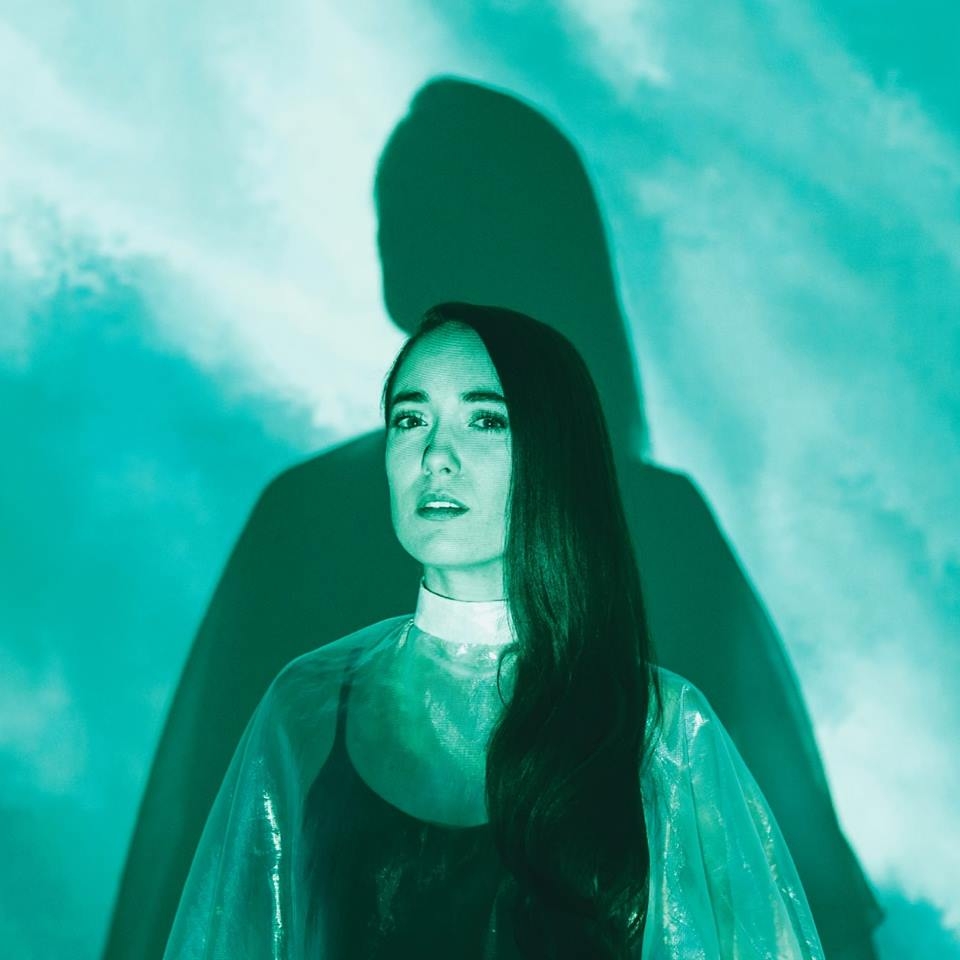
Farah Nasser on race, perspective, and change
Farah Nasser appeared on the Her-Spective webinar on March 8th as the series’ third guest speaker. The experienced local journalist covered Toronto for years and is now an anchor at Global News. She spoke on race, change, and the acceptance of different perspectives both in her industry and in the world at large.
Her-Spective is a weeklong interview series with five leading female journalists, showcasing the extraordinary voices of women in Canadian media. Co-presented by Invest Ottawa and Syntax Strategic and hosted by Catherine Clark, these engaging conversations give insight into the reality of reporting on 2020 and beyond.
Nasser grew up the daughter of immigrant parents in Canada, where they did not watch many cartoons or movies at home: they watched the news. “News was our window to the outside world” for both her and her brother, who is now also a journalist. They learned about democracy and watched live war coverage, and it was this window that inspired Nasser to keep learning about people and the world around her—and become a journalist herself.
At Global News, Nasser covered a the major events of the last few years, from the Ontario provincial elections to the Toronto van attack in 2018. 2020 and the COVID-19 pandemic have certainly made the short list, for every expected reason—and then some.
Beyond being solely a global health crisis, the pandemic has also made 2020 “a year of learning” Nasser said, particularly about race in the world at large. “We’ve seen inequity, and we’ve seen how race plays a role” in who the pandemic effects and how severely. “And we’ve seen how women bear the brunt of it.”
Combine this pandemic inequity with the fact that during the same year a massive “racial reckoning” played out on the streets of North America. These two events were not coincidences, and they are not the end of the story: “The lessons we have learned this year are going to help us in the future” Nasser said.
Recognition of racism in the world has been growing quickly in the last few years. Nasser has seen a “shift” in which many people see the problem. They now ask “what are our next steps to addressing this?”
As a woman of colour herself, Nasser has lived this experience in her career and the newsrooms she has been a part of. Though she is incredibly grateful for the bosses she has had who provide leadership that pushes for equitable newsrooms, that has not been her entire career. “I’ve still felt very alone in many situations where everyone has a seat at the table and I have a folding chair.” She said.
Nasser recognizes the privilege she has in her platform to discuss these things and advocate for marginalized people both in Canada and worldwide. But she also knows her support and advocacy is part of a much larger conversation in media today: can journalists be activists, or must they remain ever impartial?
This conversation touches on one of the biggest challenges of Nasser’s career as a woman of colour in journalism. “There are certain things to me that are non-negotiable” she said. “Some things we can’t provide two sides to what’s going on.” Though some issues don’t have gray areas on which side of the story is the right side of history, many others do. In many stories, impartiality is more necessary than ever before.
“It’s hard” Nasser said. “You’re a journalist and there’s a line you can’t cross. You have to be impartial, and see many sides of the story.” That impartiality, the ability to see every side is “something you’re always telling yourself, forcing yourself to do” She said.
When telling stories with so many sides, Nasser said, it’s important to think about the worldview behind these perspectives. “There’s a reason behind the reason we feel how we feel” she said, and that applies not only to her and her worldview but to everyone who’s story she is entrusted to tell.
Often, she explains, the ridicule and vitriol so apparent in discourse around sharp-edged topics like race stems from a sense of threat. To this, Nasser said, “The world is moving but it is not threatening—there’s room for all of us.”
Though she does not pretend to have all the solutions, one way Nasser looks at the world is important to create space for learning and difference in the shifting future. “I think we all have to have intellectual humility” she said. Acknowledging and seeking to understand others is not only important for journalists, but for every member of society in any role. “You don’t have to be the smartest person in the room. Be the most curious person in the room,” she said.
The inspiration for Nasser’s journalism career glimmered under her words, even now. By learning about people, creating space for every perspective, and telling these stories, the world grows a little wider and the fabric of society a little stronger.
This moment is the cusp of change, and Nasser is looking forwards to the future ahead.
Don’t miss the final Her-Spective speakers March 9h at noon for a candid chat with Susan Delacourt and Julie Van Dusen, two of Canada’s top media legends!
Register here: https://eventbrite.ca/e/her-spective-speaker-series-presented-by-invest-ottawa-and-syntax-strategic-tickets-140107227489









